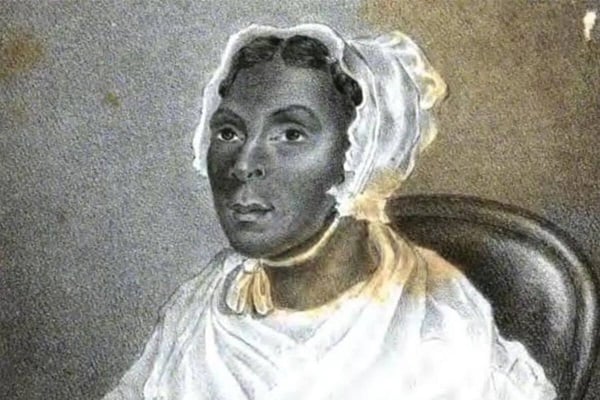“O how careful ought we to be, lest through our by-laws of church government and discipline, we bring into disrepute even the word of life. For as unseemly as it may appear now-a-days for a woman to preach, it should be remembered that nothing is impossible with God.” — Jarena Lee, “Religious Experience and Journal of Mrs. Jarena Lee,” 1849
From the pulpit to the podium, from the preaching circuit to the campaign trail, Methodist women have broken barrier upon barrier, ensuring not only their successes but the successes of future generations. Jarena Lee, who was baptized, raised, and nurtured by the African Methodist Episcopal (A.M.E.) Church, is one of these women.
Lee, who is recognized as the first Black female preacher in America and the first ordained Black woman preacher in the A.M.E. Church, was born on February 11, 1783, in Cape May, N.J. The daughter of free Black parents, Lee moved from New Jersey to Philadelphia as a teenager to work in domestic service. Later, Lee became the first Black woman to publish her autobiography, a book titled “Religious Experience and Journal of Mrs. Jarena Lee.” Lee died on February 3, 1864.
The call to preach
Lee, member of the A.M.E. Church, felt a call to preach twice in her life. When she informed Bishop Richard Allen, the founder and first bishop of the A.M.E. Church, after experiencing her first call, he told her that the church Discipline, “did not call for women preachers.” Lee was actually relieved by this information as it removed the social burden from her of becoming a public figure in a time when women were demeaned for daring to step out of their so-called “proper place.” She wrote, “This I was glad to hear, because it removed the fear of the cross.” However, her call to ministry came again.
The call to preach, again
In her journal, Lee recollects her second call, a call which came eight years later. She was listening to Rev. Richard Williams preach at Mother Bethel on Jonah 2:9, and, as she records, “he seemed to have lost the spirit.” In this moment, she writes, “I sprang, as by altogether supernatural impulse, to my feet, when I was aided from above to give an exhortation on the very text which my brother Williams had taken.” The words that proceed from her mouth describe her relationship to the text and her denial of her call to preach eight years prior.
Upon recollection of her testimony she writes, “During the exhortation, God made manifest [God’s] power in a manner sufficient to show the world that I was called to labour according to my ability, and the grace given unto me, in the vineyard of the good husbandman.” She felt God’s power residing in her, leading her to this moment. When she was finished exhorting, she recalls, “I now sat down, scarcely knowing what I had done, being frightened. I imagined, that for this indecorum, as I feared it might be called, I should be expelled from the church. But instead of this, the Bishop [Allen] rose up in the assembly, and related that I had called upon him eight years before, asking to be permitted to preach, and that he had put me off; but that he now as much believed that I was called to that work, as any of the preachers present. These remarks greatly strengthened me, so that my fears of having given an offense, and made myself liable as an offender, subsided, giving place to a sweet serenity, a holy joy of a peculiar kind, untasted in my bosom until then.”
Lee was a free Black woman living at the beginning of the 19th century. She feels a call to preach but knows deep down that embodying that call is dangerous for it would place her as a social outcast, as someone who dares to believe that they have the authority to speak on behalf of God in a public setting. She is relieved when she’s told by her Bishop that she isn’t allowed to preach. But the Spirit doesn’t leave her. For eight years she resists this call until she can no longer do so. And when she lives into that call, she is actually supported by the very Bishop who had previously told her it was improper.
Nevertheless, she preached.
Lee’s story is a rare one. It was quite rare to have male religious authorities actually support women preaching. Despite being told originally that she wasn’t allowed to preach, Lee listened to and embodied the Spirit of God.
This story was published January 23, 2023 as an excerpt from “Nevertheless, She Preached: Women’s History Month 2021” by Dr. Ashley Boggan D., general secretary of the General Commission on Archives & History. Read the full article to learn about other Methodist women who impacted the denomination and Christianity in the United States. Contact is Joe Iovino.





